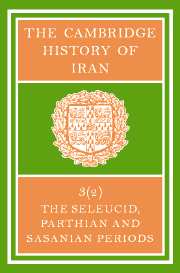Book contents
- Frontmatter
- PART 5 INSTITUTIONS
- PART 6 RELIGIOUS HISTORY
- PART 7 ART HISTORY
- PART 8 LANGUAGES AND LITERATURE
- 31 PARTHIAN WRITINGS AND LITERATURE
- 32(a) ZOROASTRIAN PAHLAVĪ WRITINGS
- (b) THE MANICHAEAN MIDDLE PERSIAN WRITINGS
- (c) MIDDLE PERSIAN INSCRIPTIONS
- 33 SOGDIAN LANGUAGE AND LITERATURE
- 34 KHOTANESE SAKA LITERATURE
- 35 KHWARAZMIAN LANGUAGE AND LITERATURE
- 36 BACTRIAN LITERATURE
- PART 9 BIBLIOGRAPHY
- Bibliography
- Index
- Index of Greek words
- References
31 - PARTHIAN WRITINGS AND LITERATURE
from PART 8 - LANGUAGES AND LITERATURE
Published online by Cambridge University Press: 28 March 2008
- Frontmatter
- PART 5 INSTITUTIONS
- PART 6 RELIGIOUS HISTORY
- PART 7 ART HISTORY
- PART 8 LANGUAGES AND LITERATURE
- 31 PARTHIAN WRITINGS AND LITERATURE
- 32(a) ZOROASTRIAN PAHLAVĪ WRITINGS
- (b) THE MANICHAEAN MIDDLE PERSIAN WRITINGS
- (c) MIDDLE PERSIAN INSCRIPTIONS
- 33 SOGDIAN LANGUAGE AND LITERATURE
- 34 KHOTANESE SAKA LITERATURE
- 35 KHWARAZMIAN LANGUAGE AND LITERATURE
- 36 BACTRIAN LITERATURE
- PART 9 BIBLIOGRAPHY
- Bibliography
- Index
- Index of Greek words
- References
Summary
No Parthian literature survives from the Parthian period in its original form. The only works of any length which exist in the Parthian language were composed under Sasanian rule. For the literature of older times we are dependent on Middle Persian redactions, or even on Persian and Georgian versions of these, to give at second or third remove some impression of the nature and scope of what has been lost. One reason for the scale of the loss is presumably that Parthian literature, both religious and secular, was oral, composed and transmitted without the use of books. The Parthians had, however, their own distinctive system of writing, attested from the beginning of the 1st century b.c., a development evidently of the chancellery script of the Achaemenians. This script was in origin Aramaic, and had been used under the Achaemenians to write Imperial Aramaic, the administrative language of their empire. Under the less firmly unified rule of the Seleucids and Parthians a number of regional forms of this script developed, of which five have been identified, namely that of the Parthians themselves, that of the Persians in the south-west (which came to be called Pahlavī), that of Median Āzarbāījān in the north-west (attested by the solitary gravestone at Armazi) and those of the Khwārazmians and Sogdians in the north-east. All these regional scripts show the same development, namely that they were used to write, not Imperial Aramaic, but instead the various local Iranian languages, with a number of fossilized Aramaic words serving as ideograms.
- Type
- Chapter
- Information
- The Cambridge History of IranSeleucid Parthian, pp. 1149 - 1165Publisher: Cambridge University PressPrint publication year: 1983
References
- 8
- Cited by

